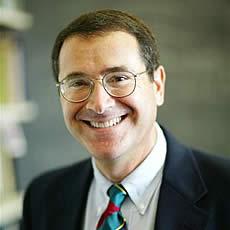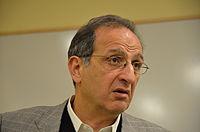The media: Still Afflicting the Comfortable
The international media – particularly U.S. print and broadcast outlets -- are accustomed to high tension with the governments they cover in Washington. The press has always relished its adversarial, intrusive and disruptive role, and presidents have never liked it. In the 1930s H.L. Mencken defined the mission of the press as “comforting the afflicted and afflicting the comfortable”.
And yet a strange peace is now emerging between the reporters and White House spokesman Sean Spicer. At the level of press briefings, the hostility is easing off. I have been monitoring these daily confrontations for two months and can sense a working relationship in the air. There is much laughter at Spicer’s quips. Questions from journalists seem less charged with suspicion. Reporters are getting on with their jobs. And they can count on the president’s ill-considered Tweets for daily headlines.
 David Halberstam, by Michael Johnson
David Halberstam, by Michael Johnson
David Halberstam, who died in a car accident just ten years ago, would have been intrigued. For his 771-page book The Powers That Be is an extended chronicle describing where the U.S. media came from, who the key innovators were and how their foresight has stimulated and directed public discourse. His narrative is the story of confrontation dating back to the birth of a powerful U.S. press in the 1920s.
Presidential politics loom large in this narrative. The book reads as a freshly told tale of high anxiety in Washington partly because history has a way of repeating itself. In many eerie passages, he echoes current controversies. He could almost be talking about the jittery climate around the administration of Donald Trump.
Speaking of White House press corps:
“The entire national waited on him; if newsmen misread the rules or transgressed even slightly, he could come down hard and quickly, indeed quite brutally, on them… He tried to shape every story. … He was so confident of himself, so sure that he was the ablest man in the country to govern, so aware in his own patrician way of his right to be doing what he was doing, that he seemed totally natural as President; it was a great art and he made it seem artless.”
His subject, Franklin Roosevelt.
And whose White House is he describing here?
“ … it was a new kind of presidency, with far more potential for manipulation and far less accountability, far more able to dominate the landscape, with a capacity to transmit its will far faster and more directly. The new conditions also meant that the inner texture of the President himself and the state of his psyche became ever more important, because the possibilities of abuse were greater than ever …”
Not Trump. His subject was John F. Kennedy and the sudden impact of political television.
Some of the great egos of the 1970s emerge vividly too, especially when performing at White House press conferences. Former CBS reporter Dan Rather felt the wrath of fellow Texan Lyndon Johnson for betraying his origins and adopting East Coast ways. As Halberstam told it:
“The first White House press conference Rather covered, Lyndon Johnson simply refused to see him or acknowledge his question … All (Rather’s) bosses were watching. A lot of institutional manhood was riding on it, it was imperative for Rather to show that he had the clout to do his job.”
Rather was never given a chance to ask his question.
Regrettably Halberstam is not around to write an update but 17 years ago he looked backward. He took a dim view of what has changed, mainly in the loss of individuality and panache. And he noted that media companies were more hungry for profits than Pulitzers Prizes. Indeed, he said, Time, Inc., had become – through acquisitions and investments – a forest products company with a magazine appendage. He said he felt his big book seemed as if it had been written 200 years ago, not 20.
Halberstam was a star reporter in his days at The New York Times, having made his name covering the Vietnam War. His skeptical coverage won him a Pulitzer Prize in 1962. He deserves credit for standing up to the good-news generals and politicians during his tour there, including U.S. Defense Secretary Robert McNamara. He asked McNamara on a Saigon whirlwind visit whether the struggle in Vietnam was not a “bottomless pit”. McNamara, still trying to be hopeful at this stage, quipped, “No David. Every pit has a bottom.” Halberstam knew better. He had done his reporting.
Those habits served him well in backgrounding this complex story of the media as in the rest of his oeuvre that covered all his passions – some 20 books on such diverse subjects as baseball, basketball, the Kennedy-Johnson years, the Korean War and various social trends.
Halberstam was an old-fashioned reporter. He had no internet, no Google searches, no Wikipedia to rely on. He spent five years interviewing about 500 people, most of them face to face. He modestly called it “straight legwork”, for which there is no substitute. Reporting at his level was and still is a rigorous and demanding profession, nothing less than a constant search for truth.
The Powers That Be – out of print but available on AbeBooks.com for a few dollars -- is especially valuable for its historical sweep. We forget that the media once did not monopolize our attention as the 24-hour news cycle of today’s cable television does. Halberstam noted that in the 1920s the Washington press corps consisted of half a dozen men “all gentlemen … the beau ideal of their time, very properly dressed, men who wore fedoras and carried walking sticks”. They packed calling cards and they never ran from one office to another. There was plenty of time to do their reporting and anyway the government was “so small”.
He looks back to the fathers and grandfather of the major publishers and editors to help explain their origins and their devotion to sound journalism. The main players made for a colorful cohort: CBS founder William Paley, Time founder Henry Luce, Adolph Ochs of The New York Times, Philip and later Kay Graham of The Washington Post, and the Chandler family of The Los Angeles Times.
Halberstam’s technique was to devote pages and pages to family background and personality, then delve into the organizations they built. It’s a sprawling theme for one book but with the help of his editors he delivers a story that drives relentlessly forward. The big events of the six decades are retold through their treatment in the media and the tension that resulted between media and government – the Depression, World War II, the McCarthy era, the invasion of Cuba, the Kennedy and Johnson period, the Nixon years and – one of the strongest chapters – the Watergate scandal.
Halberstam’s detailed portrait of Paley, son of a Russian Jew, a cigar maker, reveals a young man hooked on early radio. He built his own private radio set before receivers were available to the general public. As time passed, he was able to establish CBS as a leader because “he was so much smarter than everyone else in the business, so much more subtle, he could sell not just entertainment and products but an aura as well, the idea that CBS was different, somewhat classier, more statesmanlike…” Paley was also so handsome and rich, that enthusiasm “seemed to jump out of him”.
The story of CBS News revolves around ex-New York Times editor Edward Klauber, whom Paley recruited to build up a strong news operation. Klauber’s credo included this basic duty:
“(Reporters) should point out the facts on both sides, show contradictions with the known record and so forth. They should bear in mind that in a democracy it is important that people not only should know but should understand, and it is the analysts’ function to understand, to weigh and judge, but not to do the judging for them.”
This corporate ethos guided Edward R. Murrow, Fred Friendly, William Shirer, Alexander Kendrick, Howard K. Smith, Walter Cronkite, David Schoenbrun and others as CBS grew to dominate the competition.
American journalism was always run by men, but in one of the most interesting chapters Halberstam focuses on Katherine Graham, the first woman to break through the glass ceiling. When her husband committed suicide, she found herself in the publisher’s chair in 1963, the first woman to run a major paper. She was not interviewed for this book, at least not on the record, but Halberstam pieced together an image of how panicky she felt on her first days in her new role:
“There were men everywhere. That was the first thing about the new job. She had to deal with men who were quick and verbal and ambitious and self-assured and who had risen through the ranks against other men who were also smart and ambitious. These men seemed to know what they were doing at all times and always had the answers and they talked in a kind of insiders’ shorthand. It was easy to feel slow among them. They were not just men, that was bad enough, but a special breed of high-powered men who were always ahead of the game, always on the inside, always in the know…. They sometimes terrified her and she felt unworthy….”
She grew The Washington Post into a business so important that it was listed among the Fortune 500 companies as measured by revenue. As business ballooned, many of the editorial staff lost respect for management, including Mrs. Graham, despite the courageous confrontation with Richard Nixon’s White House and finally exposing the crimes of Watergate. Even during the Watergate investigations, Halberstam wrote, she was not sure the crusade would end well:
"She had no illusion about how little support the Post had among other newspapers; since Watergate began, she had been isolated and snubbed by most of her colleagues, treated at various professional meetings like a pariah. It was clear that most of them did not like papers like the Post and the New York Times , and it was also clear that they approved far more of Richard Nixon.”
Indeed, amid the investigations, Nixon was reelected by a landslide, only to be forced to resign as more Watergate details poured forth.
Business goals also clash with editorial goals, and here was a once independent and idiosyncratic newspaper being treated as a giant corporation. The new goals
“resembled … those of other giant corporations on that list. For a highly individualistic profession like journalism, there was an inherent contradiction in this. … Reporters were aware that in recent years Kay Graham had committed herself more and more to profit, to winning Wall Street’s approval.”
In one unforgivable gaffe, she told a group of business leaders that she dreamed of winning a Pulitzer Prize for business management.
David Halberstam was a stickler for accuracy. His double-checked facts made his career. When the current White House started attacking media for dishonesty this age-old contentious relationship descended into another uncomfortable period. A New York Times columnist recently bristled over the tone and content of the attacks.
“Fact-based journalism is a ridiculous, tautological phrase,” wrote Roger Cohen. “There’s no other kind. Facts are journalism’s foundation the pursuit of them, without fear or favor, is its main objective.”
And what would he make of the eclipse of the television and print dinosaurs by social media? He would have a field day.
Another version of this article appeared in the March edition of
www.openlettersmonthly.com
FOR FACTS AND ART'S WEEKLY NEWSLETTER, PLEASE CLICK HERE.

This article is brought to you by the author who owns the copyright to the text.
Should you want to support the author’s creative work you can use the PayPal “Donate” button below.
Your donation is a transaction between you and the author. The proceeds go directly to the author’s PayPal account in full less PayPal’s commission.
Facts & Arts neither receives information about you, nor of your donation, nor does Facts & Arts receive a commission.
Facts & Arts does not pay the author, nor takes paid by the author, for the posting of the author's material on Facts & Arts. Facts & Arts finances its operations by selling advertising space.
















